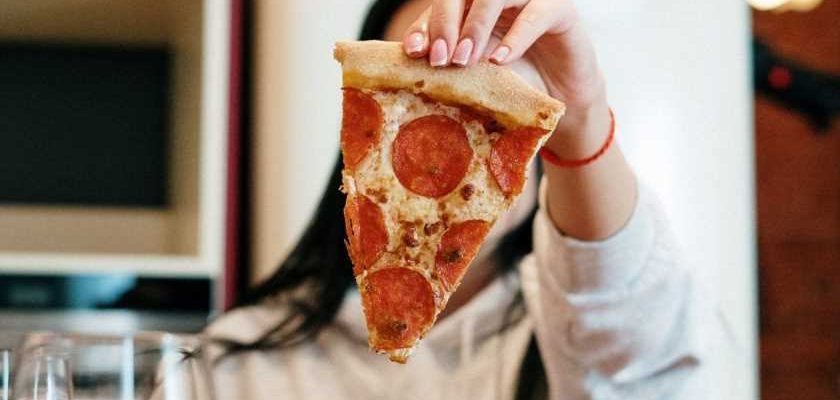“Telling me to ‘burn off the weekend binge’ isn’t just wrong – it’s dangerous”
Promoting a binge-and-burn cycle harms women’s relationship with food, says senior writer Chloe Gray.
Things I want at 10am on a Sunday morning include an oat flat white from the posh coffee shop below my flat, toast in bed and a gentle stroll in the fresh London air. What I really don’t want is to be shamed for the choices I’ve made in the preceding days.
But that was what I got last weekend when I opened my inbox to find an email from a supplement company. The subject: “Burn off that weekend binge”, accompanied by a pizza emoji. Inside, there were links to some of the products it sells, including a ‘fat metaboliser’, ‘carb blocker’ and ‘hunger buster’.
The brand in question was Protein World – the same company that had its controversial ‘Are you beach body ready?’ advert banned from reappearing in the UK over its health and weight claims. Seven years later, its marketing appears to still rely on selling the pursuit of skinniness via shame.
To me, it doesn’t take much hard work to unpick that’s what is being implied in the recent email. The subtext reads, “You had a weekend that involved eating foods that are stereotypically deemed ‘bad’, such as pizza. To avoid becoming fat, gaining weight or generally being grotesque, you need to try to undo that ‘damage’.” Somehow, in 2022, that email got the go-ahead.
This ‘binge-and-burn’ cycle is one that has plagued women for years. A 2013 survey found that three-quarters of women say they often feel guilty about how much they eat, and many refuse to tell family and friends the truth about how much they consume.
You may also like
Calories on menus make food just about energy intake – here’s why an dietitian is warning against the food shame
Today, however far you may think we’ve come, mainstream narratives still suggest that the primary purpose of exercise is to burn off food (think of the calorie-shaming articles that pop up in December that describe how many star jumps are needed to burn off a single pig in a blanket) and there’s a widespread belief that eating something delicious must be followed by periods of food restriction.
This thought process is detrimental to our mental and physical health, says dietitian Renee McGregor: “The suggestion that it’s fine to be overly restrictive during the week and then have a blowout at the weekend because you can curtail it through ridiculous supplements is really dangerous. It feeds into this stereotype that we should all be one straight size, we should all look the same and that we all should fit an unattainable body ideal.”
Brands jumping onto this pressure further normalise the horrific cycle of eating and burning, but they also make money by selling (unscientific) ‘cures’ to vulnerable people who already feel unjustifiably guilty. We are made to feel that we have to part with our money to correct our dietary and bodily mistakes.
While Protein World does state that “these capsules are not magic pills and will not make you drop the pounds overnight”, they do claim that “these capsules are the best way for you to maintain weight loss over a heavy weekend or get back on track”.
But to McGregor, “there’s no evidence for any of these weight loss products working. “Alleging to speed up your metabolism with stimulants can be really dangerous, especially for people with heart problems or those who aren’t used to caffeine. Actually, the only way you can ‘speed up’ your metabolism is by developing lean muscle mass.
“But more to the point, why should people be shamed about having a night out or wanting to eat out with their friends and enjoy food? Absolutely, we shouldn’t be doing that every single night of the week, and there are ways to be mindful about nutrition and alcohol consumption for your health. But taking a pill is definitely not the answer,” she says.
You may also like
Strength training for my mental health: why my workouts aren’t for my body, but for my mind
Luckily, I didn’t read that email after a weekend of indulgence (and it’s important to note that food freedom and enjoyment are different to ‘binging’, despite what Protein World’s email suggests). Instead, I’d been Covid bound and barely able to stomach any food at all. But I thought of the friends who had been posting live updates of their weekends – 15-second clips of restaurant flat lays and pictures of themselves with glasses of wine in hand. If they had received that email the morning after those nights, how would they have felt?
I’d hope, at best, they’d be dismissive; at worst, angry – but no doubt some would start to spiral. I’ve had enough conversations with friends to know that a rosé hangover and decades of conditioning can fill you with enough shame to believe – and buy – almost anything.
Images: Pexels
Source: Read Full Article
